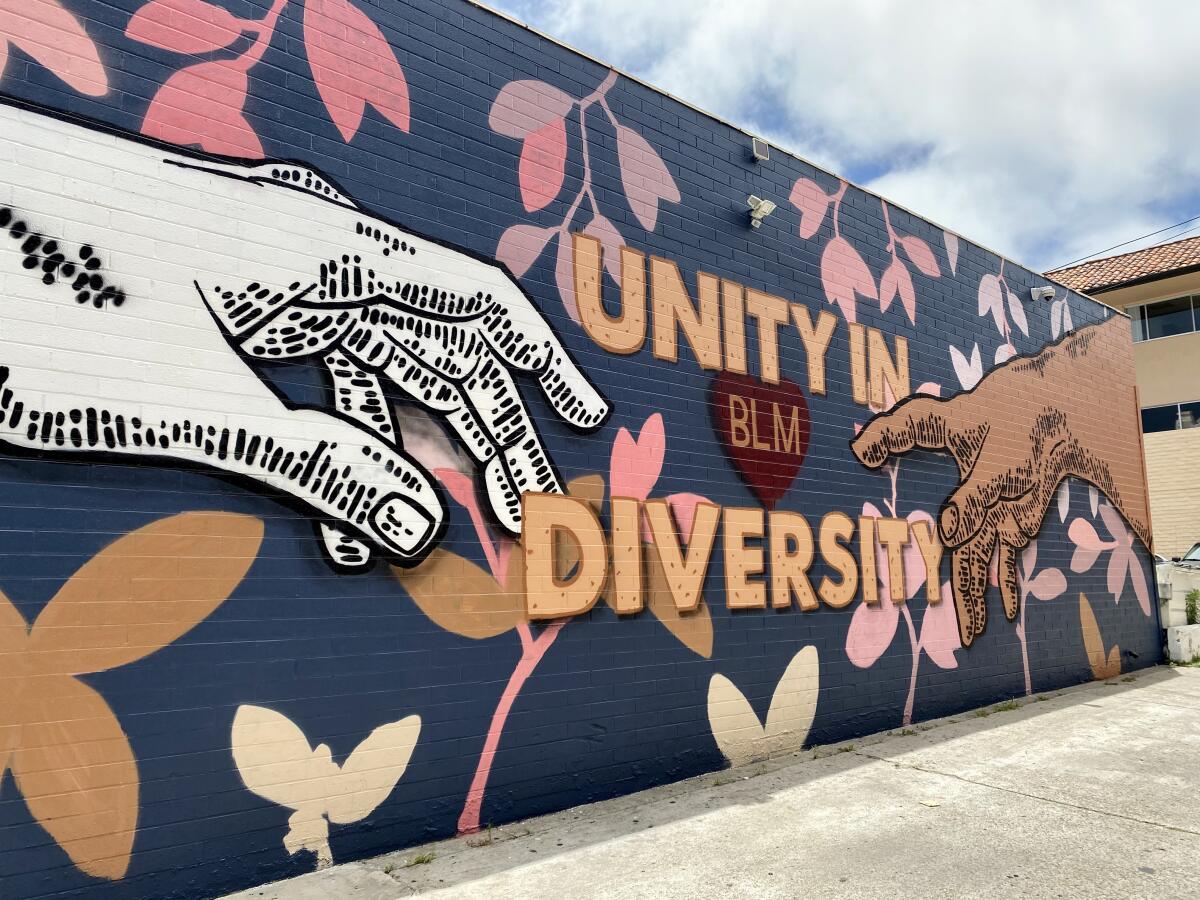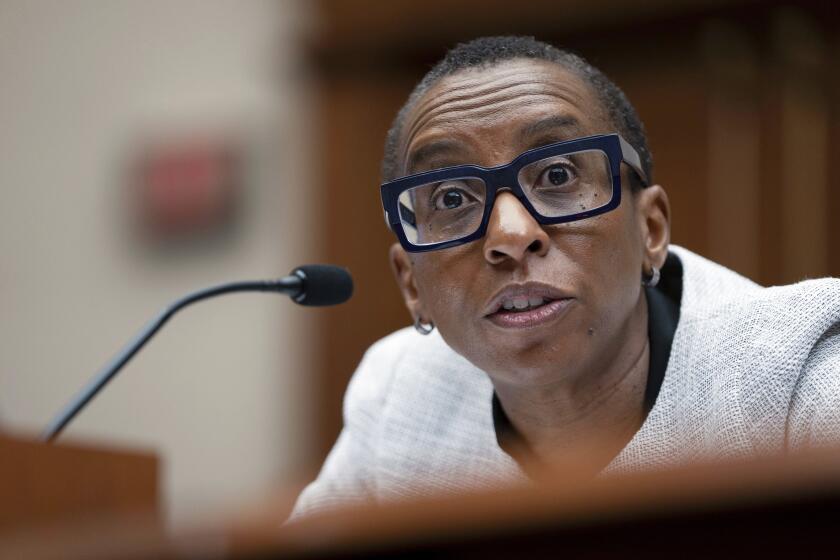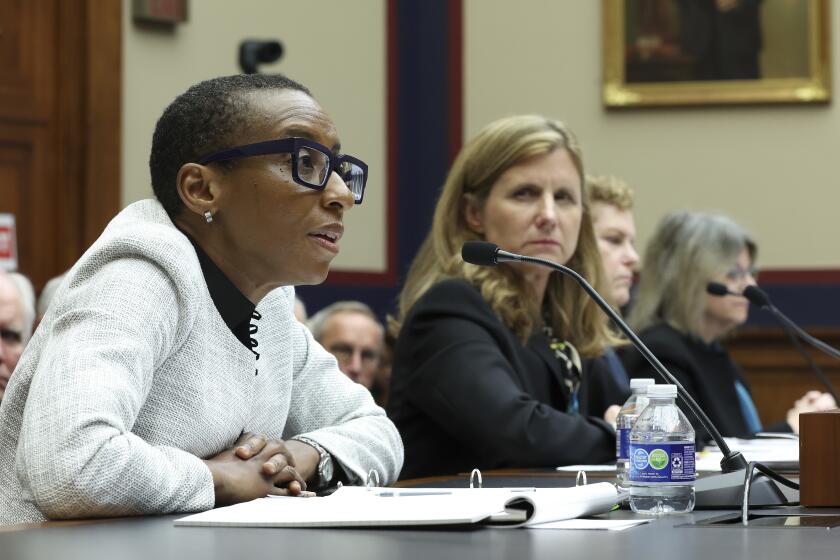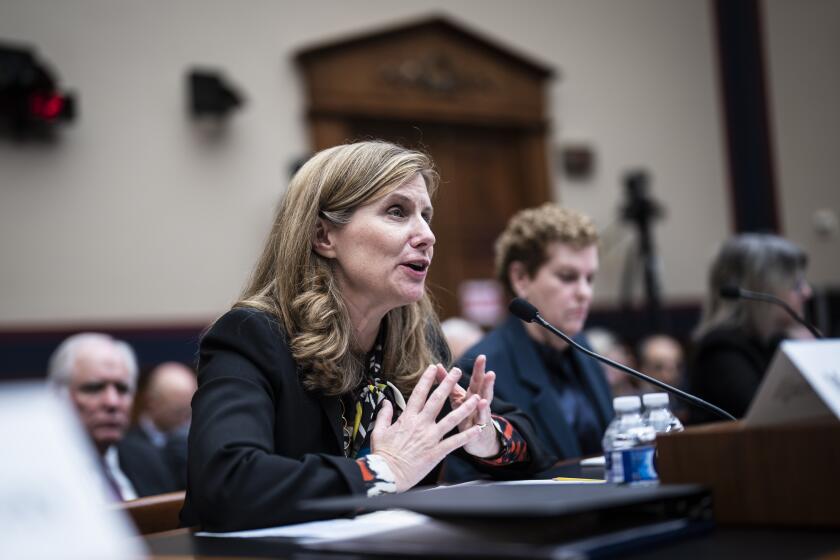The resignation of Harvard’s Claudine Gay is touted as a DEI failure, but that’s hardly the case

- Share via
Let’s be honest.
Conservatives didn’t come after former Harvard President Claudine Gay because she had plagiarized some of her academic research. They didn’t come after her because she gave Congress a morally indefensible answer to the question of whether calls for genocide of Jews on campus violated speech codes.
They came after her because she represented what her right-wing critics believe are the crimes of the diversity, equity and inclusion movement, and because the very existence of DEI is offensive to those who believe we live in a meritocracy where all start on a level playing field and excellence floats to the top. Basically, they decided she had to go, then reverse-engineered a campaign against her.
“While her resignation is a victory, it is only the beginning,” Christopher Rufo, the conservative activist who led the charge against Gay, wrote in the Wall Street Journal. Rufo also happens to be the architect of the phony panic over critical race theory. “If America is to reform its academic institutions,” he wrote, “the symbolic fight over Harvard’s presidency must evolve into a deeper institutional fight.”
Maybe Gay, despite thinner academic credentials than Harvard presidents past, would have been a superlative president, a phenomenal fundraiser, a visionary university leader. We will never know.
She is now a notch on the belt of the conservative ideologues seeking to undo what they consider to be left-wing ideological excesses pervading American universities.
Claudine Gay and the presidents of MIT and Penn are taking heat for their evasive answers to questions regarding antisemitism on their campuses.
“TWO DOWN,” trumpeted New York MAGA Republican Rep. Elise Stefanik. Her calculated questions about whether students who called for the genocide of Jews in the aftermath of the gruesome Oct. 7 Hamas attack in Israel violated university speech rules also led to the resignation of University of Pennsylvania President M. Elizabeth Magill.
This is yet another salvo in the conservative war against the “woke” forces of higher education. “The campaign against me was about more than one university and one leader,” Gay wrote last week in a New York Times essay. “For the opportunists driving cynicism about our institutions, no single victory or toppled leader exhausts their zeal.”
She’s absolutely right. Gay’s ouster, according to the Wall Street Journal, “has emboldened Republican lawmakers and their conservative allies, who think they have fresh momentum and a new playbook to reverse what they deem the progressive takeover of American education.”
Universities must keep students safe. But a broad new rule prohibiting ‘advocacy of genocide’ would not protect students and could be used against any group.
That effort was already well underway. Nearly half the states have proposed or passed laws outlawing DEI initiatives on public campuses.
Last year, Republican presidential aspirant and MAGA stuntman Gov. Ron DeSantis staged a high-profile takeover of the public New College of Florida, a liberal arts bastion with a large LGBTQ+ population. In: athletics. Out: gender studies. The diversity office was eliminated. (Rufo, not incidentally, is one of the newly appointed members of the school’s board of trustees.)
Bill Ackman, the billionaire investor and Harvard alum who pushed for Gay’s ouster, demanded last week that the members of the Harvard board who hired her should step down and that the university’s DEI office be closed and its staff fired.
“Having a darker skin color, a less common sexual identity, and/or being a woman doesn’t make one necessarily oppressed or even disadvantaged,” wrote Ackman in a 4,000-word statement posted on X.
Leaders at University of Pennsylvania, Harvard and MIT failed to show moral clarity and good sense with evasive answers regarding calls for the genocide of Jews.
He makes some good points in his long thread — among them that a climate of fear on campuses has led to self-censorship, that “microaggressions are treated like hate speech” and that “campus speakers and faculty with unapproved views are shouted down, shunned, and canceled.”
But Ackman’s statement also illustrates the particular cluelessness of privileged people who refuse to acknowledge that history did not begin last week, or last year, or that individuals are subject to social and political systems well out of their control.
And yes, while the color of your skin, your gender or sexual orientation won’t automatically condemn you to a life of oppression and poverty — that argument is a straw man — people possessing those traits have in fact been oppressed and disadvantaged and, in many cases, still are. Acknowledging that doesn’t make you some wide-eyed wokie. It means you’ve paid attention to American history.
For many, the lasting image of Milo Yiannopoulos in his fizzled “Free Speech Week” appearance on the UC Berkeley campus will be of the selfie he took as he was surrounded by a small throng of admirers and journalists.
I’ve spent plenty of time on college campuses in the last decade, and it’s clear to me that one of the most precious aspects of diversity — viewpoint diversity — has taken a back seat to political correctness, which is tragic. A few years ago, I had conversations with students at UC Berkeley, the cradle of the Free Speech Movement, who argued that speakers like then-popular conservative contrarian Milos Yiannopoulos should be banned.
In the Washington Post last month, Harvard professor Danielle Allen, a contemporary of Gay’s, who teaches political philosophy, ethics and public policy, wrote about her experiences trying to balance competing values on campus. A proponent of DEI, she also — quite reasonably — believes it needs to be reformed.
“We have been focused so much on academic freedom and free speech,” she wrote, “that we have neglected to set standards for a culture of mutual respect.”
This might seem like a counterintuitive take from a liberal scholar who was a co-chair of Harvard’s Presidential Task Force on Inclusion and Belonging, which produced an 82-page blueprint focused on ways to promote inclusion and mutual respect among vastly different constituencies. But on further examination, it isn’t at all.
Allen is a realist: “Across the country, DEI bureaucracies have been responsible for numerous assaults on common sense” — certain mandatory diversity training initiatives come to mind — ”but the values of lowercase-i inclusion and lowercase-d diversity remain foundational to healthy democracy.”
They surely do, and despite the efforts of folks like Rufo and DeSantis, they always will.
More to Read
A cure for the common opinion
Get thought-provoking perspectives with our weekly newsletter.
You may occasionally receive promotional content from the Los Angeles Times.














